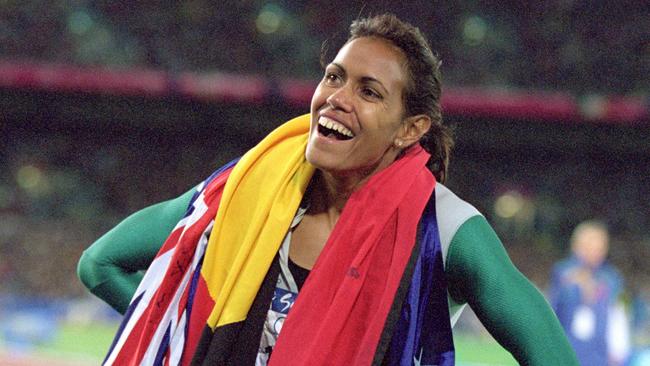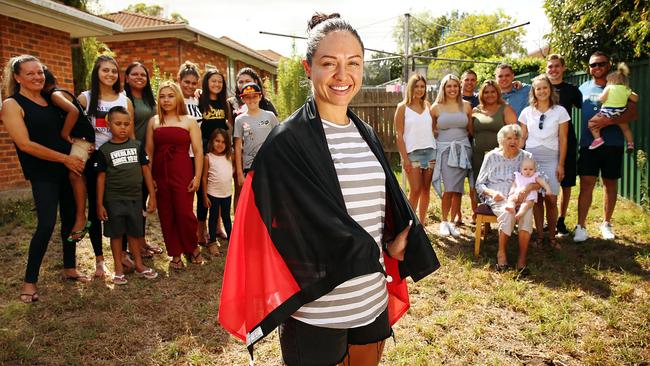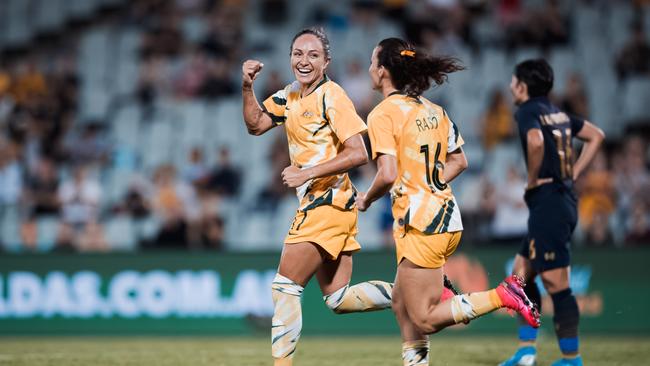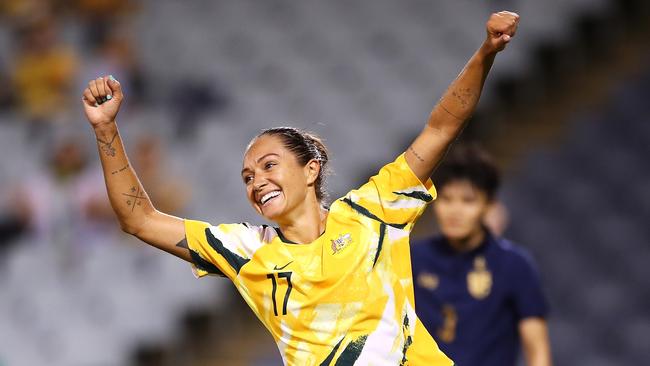Indigenous Sport Month: Cathy Freeman sparked Kyah Simon’s own journey to sporting greatness
Indigenous Sports Month ambassador Kyah Simon reveals the moment shared by all Aussies that inspired a then nine-year-old child to harness the strength of her culture and dream big.
Women's sport
Don't miss out on the headlines from Women's sport. Followed categories will be added to My News.
Waiting for Cathy Freeman to run changed my life.
At the time, I was nine.
A Quakers Hill schoolgirl who spent every Saturday playing rugby league, then soccer, but never with the intention of doing anything much with either.
The Matildas?
I didn’t even know they existed.
Just as there wasn’t a female athlete, black or white, who I dreamed of becoming.
I was proud of my Aboriginality, sure. A gift provided by both my parents, Gordon and Pam, and grandmother Betty Hampton. But still, I never really had a focus, a dream.

Or not until that unforgettable September night at the 2000 Sydney Olympics – and the women’s 400m final.
Honestly, I can still see it now so clearly.
I can still feel, too, the anticipation in my family’s living room while, together, we all sat glued to the TV as those minutes ticked down.
More than anything else that night, it’s that wait which changed me. Inspired me. Just the power of it all.
Even as a young girl, I realised the feeling of anticipation wasn’t just mine. Or even my family’s. But that of an entire nation.
As a young girl, I couldn’t quite believe it.

That all of Australia could be held captive by the pursuit of not just a woman, but an Indigenous woman.
Which is why Indigenous Sport Month is so crucial.
And why, as its first ambassador, I’m so proud to be part of a campaign that over the next several weeks will not only highlight the athletic and moral heroism of Indigenous athletes, but also those moments that inspire, signify progress, and bring change.
Importantly, moments that show how much work is still to be done.
Put simply, the goal of Indigenous Sport Month is to engage, educate and empower all Australians on the successes, challenges and triumphs of Indigenous athletes.
A month I also hope, over time, will be used to break down other barriers that Indigenous communities are facing, such as those within education, the judicial system and health.
Undoubtedly, this is the power of storytelling. Always has been.
Like that night Cathy donned a green, lycra hoodie – then went and won it all.
Or afterwards when she lapped that Olympic stadium with the Australian and Indigenous flags knotted together as one.
Still for me, the real power was in the wait.

Understanding that, yes, we are the world’s oldest living culture.
A mob famed for the athletic beauty that is Arthur Beetson, Evonne Goolagong-Cawley, and boxer Lionel Rose – for whom 100,000 cheered in 1968 when he returned to Melbourne as the WBC bantamweight king.
But this night with Cathy, it was different again.
With the nation united not in celebration, but in the hope of victory.
Rarely can an athlete stir such emotion, let alone evoke it, so powerfully, from an entire nation.
Which is why Cathy Freeman remains my first, and greatest, sporting hero.
Why in the days after she claimed that Olympic gold, I wouldn’t only discover who the Matildas were, but tell my parents that’s exactly what I was becoming.
Which is why now, Indigenous Sports Month is so important.
Not only for putting a spotlight on all the champions our people have produced – a list including my cousins Kurtley Beale and Kyle Vander-Kuyp – but also to empower that next generation of Australians.
More than simply celebrating our mob, this is about empowering them.

Allowing young people to find a voice. A direction. A reason.
Had I never seen Cathy Freeman run, I’d never have aspired to pursue the Matildas team that has now been my life for 13 years.
Nor would I have undertaken the incredible journey that, in the past couple of seasons alone, has seen me playing with Houston Dash in America, and now PSV in the Netherlands.
And being so far from country, it can be tough at times to stay connected.
Which is why only recently I’ve started working closely with Football Australia to increase both the opportunities for Indigenous footballers in this country.
Undoubtedly, it’s a big task. With plenty of hard work ahead.
Yet anytime you want change to occur, people must first believe in the work you’re doing.
That, and the people you’re doing it for.
Which again, is why it’s so important to shine a light on all those Indigenous athletes making a difference right now.
Understanding that when illuminated, a life can change even waiting for them to race.
More Coverage
Originally published as Indigenous Sport Month: Cathy Freeman sparked Kyah Simon’s own journey to sporting greatness





